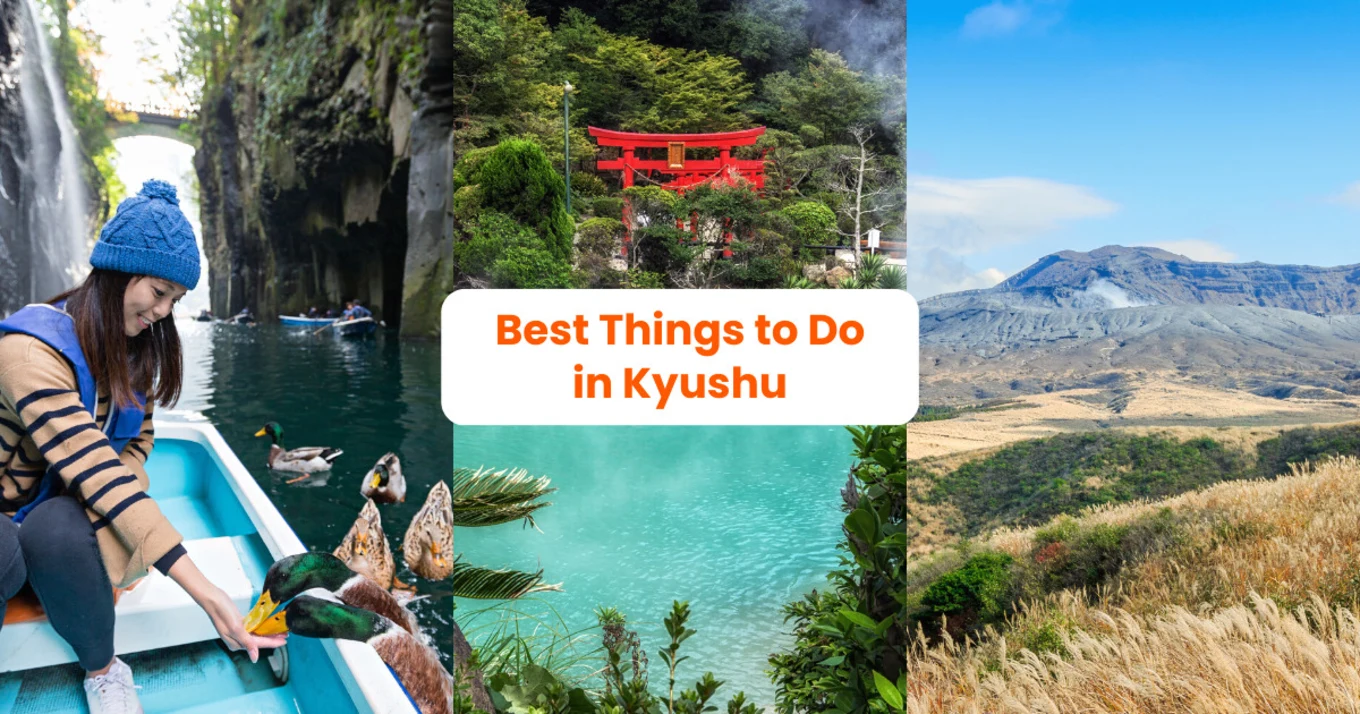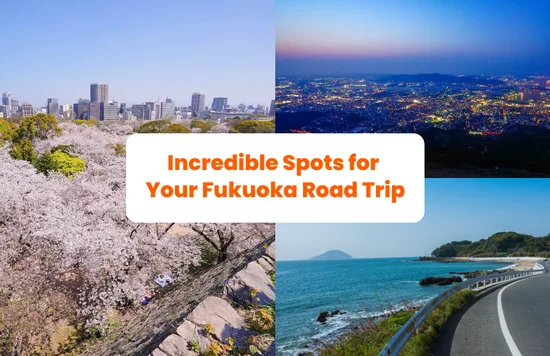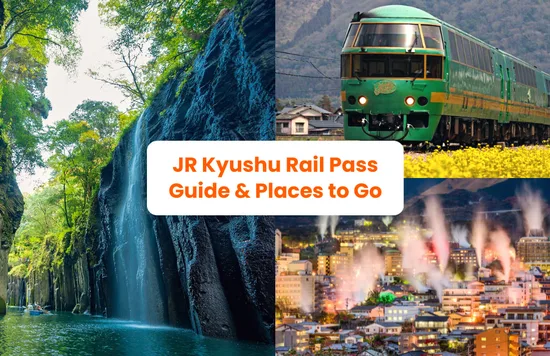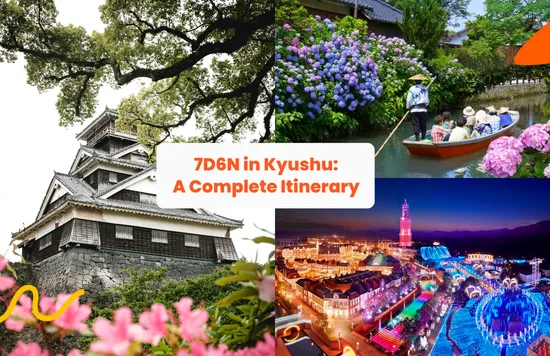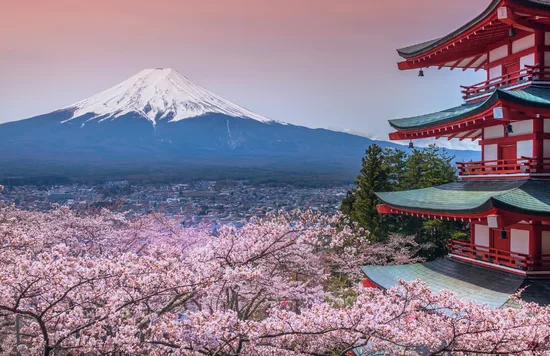Here's why Kyushu should be your next trip to Japan!
Wanna explore something different in Japan? Check out Kyushu, the third-largest island of Japan's five main islands. Kyushu is known for its beautiful mountainous terrains, something the island can never run out of.
Learn more about getting around Kyushu below!
1. Is Kyushu near Tokyo?
Tokyo is the farthest major city from this island. Kyushu, Japan is the prefecture in the very southwest of the land of the rising sun. It is also home to the well-known tourist destination, Nagasaki. Because it is so far south, many travellers leave it off their Japan itinerary and instead choose to spend more time in major cities such as Osaka and Kyoto.
However, this beautiful island of Japan is home to some of the most incredible outdoor experiences Japan has to offer. Keep scrolling to see exactly why you shouldn’t sleep on visiting Kyushu.
2. How is Kyushu different from the rest of Japan?
With the island being the southernmost area of the country and being the closest to continental Asia, it has been the location where many of these cultural exchanges occurred since ancient times.
More than that, Kyushu’s mountainous terrain, volcanic ranges, and natural landscapes are what make it different from the rest of Japan. It is a beautiful island filled with nature, making it a perfect getaway from the city.
3. What is Kyushu famous for?
Kyushu is known for its many hot springs, mountains, and beaches. It’s known as ‘onsen island,’ meaning that it has a lot of good quality hot springs scattered around the island from its many active volcanoes.
4. Is Kyushu Beautiful?
The short answer is yes! Known as Japan’s southern paradise, the island boasts mountains, valleys, volcanoes, forests and beaches. Its natural beauty is one-of-a-kind and definitely worth a trip to the country. With its warm climate, you can easily go around the island and visit as many spots as possible.
5. Does Kyushu have snow?
The climate in the south is subtropical, which means it doesn’t really get as much snow as other areas of the country. Snowfall is only common in the mountainous areas of Northern Kyushu, such as the Aso area in Kumamoto prefecture, western Oita prefecture, and northern Miyazaki prefecture.
6. What food is Kyushu famous for?
Originating from Kyushu itself, hakata ramen, or tonkotsu ramen, is the island’s signature dish. Its broth consists of pork bones and collagen cooked over many hours. It might be the richest of all the ramen styles available in the country because of its rich use of pork!
Fukuoka is also the birthplace of the famous Ichiran Ramen!
7. How long should you spend in Kyushu?
Figuring out how long to stay in Kyushu depends on how long you have in Japan. If you’re only spending 2 weeks in the entire country, we’d recommend dedicating 3-4 days to the region of Kyushu. This will give you enough time to tick off all the area's highlights, such as the Takachiho Gorge, Mount Aso Volcano, and even a day trip to Nagasaki, and the 99 Islands.
If you’re an avid hiker or outdoor enthusiast and prefer to spend your time in nature rather than the cities, you could easily do 7-8 days in Kyushu, splitting your time between Kumamoto and Fukuoka. There are many mountain hikes to choose from in the area, and all can be easily accessed using the Japan Rail (JR) lines.
8. How to get to Kyushu?
There are several ways to get to the region of Kyushu. If you have started your journey through Japan in one of the major cities like Osaka or Tokyo, then the easiest way to Kyushu is the Shinkansen train from either city to Fukuoka or Kumamoto.
If you’d prefer to start your time in Japan in Kyushu, then there is a large international airport in Fukuoka which is serviced by direct flights on Singapore Airlines.
Driving between the two cities would dramatically increase the travel time, as the drive is approximately 7-8 hours long. So, it’s best to use either the Shinkansen or take a flight.
The travel time from Osaka to Fukuoka Hakata Station is roughly 2 hours. A flight between those two cities will take approximately an hour.
9. Where to stay in Kyushu?
When choosing where to stay in Kyushu, Japan, you need to consider a few factors:
- How long will you be in Kyushu?
- What is your mode of transportation?
- What activities will you be doing?
Two main cities in Kyushu provide the perfect base for day trips and other activities: Fukuoka and Kumamoto.
Fukuoka
The city of Fukuoka will be the first major stop in Kyushu if you are travelling onboard Japan’s famous Shinkansen. It is also the best place to stay and base yourselves to explore the region around Fukuoka.
Firstly, the city is the major dining and shopping hub of Kyushu, so if you’re looking to splurge on some Japanese fashion labels, or dine out at the best restaurants, Fukuoka is the city to be in!
Fukuoka is also very well connected to all other areas of Kyushu. You’ll easily find yourself being able to use the JR lines to get to even the most rural seaside towns or explore the northern coastal region of Kyushu. The most popular of these is Mojiko, where you can get a rickshaw ride around the harbour at sunset!
Kumamoto
The other major hub for tourists in Kyushu is the city of Kumamoto. Further down south than Fukuoka, Kumamoto is slightly smaller in size. While both offer easy access to most experiences and attractions in Kyushu, Kumamoto is better positioned for travellers wanting to explore the Aso Volcano region, as well as Takachiho Gorge.
Kumamoto is also much closer to Nagasaki, and the ‘99 Islands’ district, if you were planning on visiting these parts of the region. There are day trips to each of these locations which will all depart from Kumamoto.
Fun fact: Each city in Japan has a mascot, and the one for Kumamoto is a bear called Kumamon. He is one of the most famous Japanese city mascots!
10. Best things to do in Kyushu
Kyushu really does have a huge variety of activities and experiences for travellers to enjoy. From the shopaholic to the avid hiker, and even the family travelling with kids, Kyushu will have something for you.
Below we’ve outlined some of the most popular activities to do in the region:
Kanmon Rickshaw Tour
If you travel 45 minutes on the bullet train from Fukuoka towards the north of Kyushu, you will stumble across the seaside town of Mojiko. This is where you can experience an incredible rickshaw ride around the coastline.
The experience starts at the historic Mojiko Station, which is one of the oldest train stations in all of Japan. The town itself used to be a major shipping hub for Western countries exporting and importing with Japan, so there is certainly a lot of history to take in.
Takachiho Gorge Day Trip
One of the most enchanting parts of the Kyushu region is the Takachiho Gorge, located about 2 hours outside of Kumamoto. If you’re staying in Fukuoka, it’s only a 30-minute Shinkansen down to Kumamoto.
If you aren’t taking your own car, the only way to experience Takachiho Gorge is through a private day tour. Due to the rugged landscape, there is very limited public transport to the area.
Not to worry, we’ve got you covered with this incredible day trip to Takachiho Gorge, departing from Fukuoka. During the tour, you’ll be taken to viewpoints over the mountains of Kyushu, view cherry blossom trees at Jyosen Temple, and then, of course, spend time near the amazing Takachiho Gorge.
There is the option to rent a small paddle boat when you get to the gorge, and this is something we highly recommend doing. It’s best to do the tour during the week if you can, as the gorge can be very popular with locals and students on weekends.
Beppu Onsen and Yufuin Spa Town
Another absolute must-do while in Kyushu is to check out the country towns of Beppu and Yufuin. These two towns are hidden in the hillside of Kyushu and are well known for their natural hot springs found within them.
You will find a total of 8 natural hot springs, which are known as ‘hells’ to the locals, because of the ominous steam which bubbles up from each of them.
Each hot spring, or ‘hell’, has a particular theme to it. There is the crystal blue ‘ocean hell’, there is also a bubbling mud hell. Some of the hells are even dedicated to animals like the crocodile hell, which is essentially just a natural hot spring in the center of what is now a reptile and crocodile park.
Most of the hells are far too hot for you to actually bathe in, with the water temperature of each close to boiling. But there are still places to get your spa on - nearby to the crocodile hells is a natural foot spa, heated by hot spring water that travellers can experience free of charge.
You also have the opportunity to cook your own meal at Jigokumushi Kobo, where naturally hot steam is channelled here. You'll get to enjoy a simple and healthy meal and really taste the natural sweetness of the Kyushu produce right here!
Mount Aso Volcano
Another major attraction for travellers to the region is the famous Mount Aso Volcano and the surrounding caldera area. There was an earthquake in 2016 which left widespread damage to the area, much of which is still being repaired today. However, this damage doesn’t stop you from experiencing the incredible peaks of the volcano caldera, which is made up of several active volcanoes.
On your tour of Mount Aso, you’ll again be taken to several viewpoints in the caldera, where you can gaze out at the peaks and down onto the farmlands. The contrast between tranquil green fields in the valley, and a smoking volcano in the distance can make for some incredible photography.
If you're looking for an adventure of a lifetime, don't miss out on a tandem paragliding! Sore above the famous fields against the setting sun. It's guaranteed to be a thrilling experience!
11. How to get around Kyushu?
One of the best ways to explore the wonders of Kyushu is by renting a car. Once you experience it, you’ll feel as if Kyushu was made for road trips.
Apart from wide space, smooth roads, and polite drivers, you can also expect a whole lot of views of majestic mountains, lush forests, and the clearest rivers. To top it all off, there are many rest stops called michi-no-eki, roadside stations where you can park for free and rest in between your destinations!
If driving isn't your thing, you can still easily explore Kyushu with the JR Kyushu Rail Pass. With these passes, you’ll get unlimited access to all the JR trains in Northern Kyushu, Southern Kyushu, or all of Kyushu depending on the rail pass you select.

